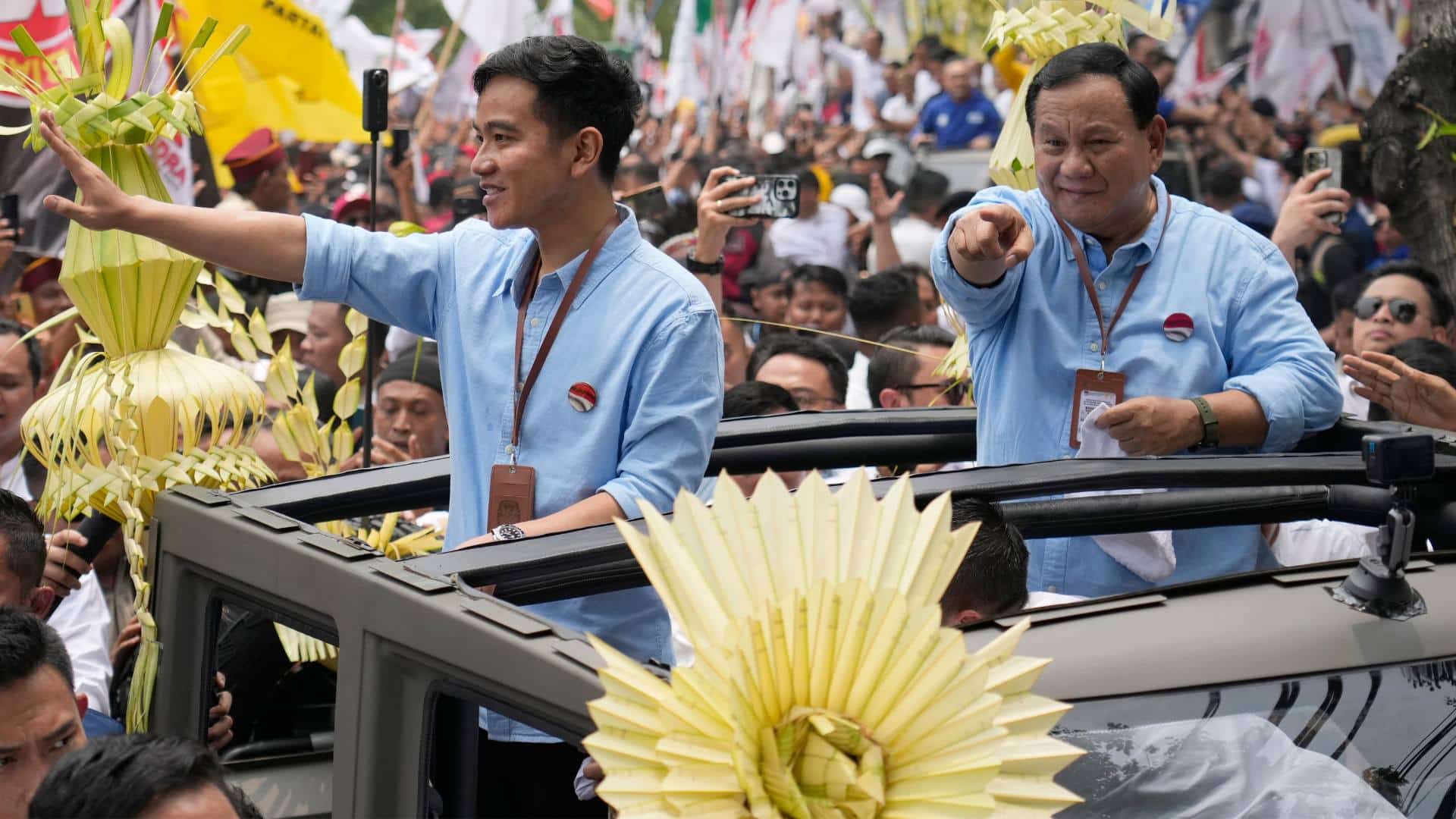The upcoming election pits employment against the environment. Meanwhile China and the United States wait to see whether the new president will look east or west.

Indonesian presidential candidate Prabowo Subianto, right, and his running mate Gibran Rakabuming Raka, the eldest son of President Joko Widodo, greet supporters upon arrival to register their candidacy to run in the 2024 election at the General Election Commission building in Jakarta, Indonesia, 25 October 2023. (AP Photo/Achmad Ibrahim)
This article was produced exclusively for News Decoder’s global news service. It is through articles like this that News Decoder strives to provide context to complex global events and issues and teach global awareness through the lens of journalism. Learn how you can incorporate our resources and services into your classroom or educational program.
On 14 February, Indonesians will choose a successor to a man who will leave office as popular as when he first became president almost a decade ago. That’s unusual for any long serving leader of a democracy.
The international community seems to share that enthusiasm for President Joko Widodo. An amiable money-spinner, Widodo focused on lifting up the economy of the world’s third-most populous democracy and tapping foreign investment.
Whoever moves into the leadership seat will find himself caught between conflicting positions: Its two biggest partners are China and the United States, both of which have clashed in the South China Sea, an area to which Indonesia also claims rights.
And the winning candidate will be caught between the need to protect Indonesia’s fragile environment and the pressure to develop its lucrative natural resources.
Till now, Widodo, commonly referred to as Jokowi, has avoided friction with Indonesia’s foreign partners by choosing to not project the power that comes with being Southeast Asia’s biggest economy. In exchange he has won their funding.
Indonesians to choose between three candidates
There are three candidates vying for Widodo’s seat and if the debates among them are anything to go by, the next president of the world’s fourth-most populous country is unlikely to change that approach.
Prabowo Subianto is a former general who twice ran unsuccessfully. But polls predict he will most likely win in this go-around. He told Kompas newspaper late last year that he believes in a good neighbour policy. “My foreign policy principle is that a thousand friends are too few and one enemy is too many,” Kompas newspaper quoted him as telling a meeting. That’s much the line his opponents promise if they bother to discuss foreign affairs at all.
In this election race the interest is overwhelmingly on keeping prices down and creating more jobs. Almost 60% of the archipelago’s 200-plus million eligible voters are either millennials or Generation Z — generally defined as those born between 1997 and 2012. Gen Z alone accounts for a quarter of the total. Not surprisingly, they are the ones the candidates court.
China’s growing dominance in the Indonesian economy may be worrying to those who watch geopolitics, but as the second biggest investor in Indonesia with a voracious appetite for its minerals, it makes little economic sense to Indonesian politicians to spurn Beijing’s cash.
Indonesia is the world’s biggest producer of nickel, a metal that has grown in desirability as a vital element in electric cars. China has a powerful hold over the mining and smelting of nickel in the country.
The environment versus employment
But it is not at all clear that the average voter really cares where the money comes from if it means the promise of more jobs in an economy in which some 60% of the labour force work in the informal sector, where living wages are rarely guaranteed.
China’s claims over territories in the South China Sea meanwhile are opposed by several countries in the region and represent a geopolitical challenge.
Both Subianto and the other leading presidential candidate, Ganjar Pranowo, propose beefing up the giant archipelago’s military, especially the navy. The third, Anies Baswedan, wants the 10-member Association of Southeast Asian nations to take the lead in handling potential conflict although the group has no history of taking on such a role.
While there is clearly no appetite to escalate tensions over these territorial disputes, they will remain a tricky challenge for whoever makes it to the presidential palace.
And that is partly why the next president will likely work to keep strong relations with the United States as a balance to China’s influence.
Facing off against foreign powers
As for the candidates, only two have much experience overseas.
Ganjar Pranowo is a former provincial governor and is backed by the country’s largest political party. He is better known for his efforts to improve the lot of Indonesia’s farmers. His vice presidential running mate, however, may prove more controversial in the West with past suggestions that gay sex be banned.
Anies Baswedan, an academic and activist running third place in the polls, studied in the United States where he earned a doctorate. However, there were mixed reviews of his time as governor of the capital Jakarta and he was criticised for openly seeking votes during that election from a radical Islamic group which was later banned by the government.
But it is Prabowo Subianto who is the best known outside Indonesia, mostly over allegations of human rights abuses during his time as an army general during Indonesia’s occupation of East Timor and later during the downfall of President Suharto, his then father-in-law.
But in this campaign the 72-year-old has, according to political commentator Virdika Rizky Utama, turned himself into “an adorable grandpa” for younger voters who seem to ignore his dark past.
And while he is the oldest of the candidates, his running mate is the youngest and, as it happens, a son of the popular outgoing president.
Three questions to consider:
- What do people in Indonesia most care about in the presidential election?
- What big issue in Indonesia is of concern to the rest of the world?
- Do you think that being able to get a job is more important than worries over the environment?

Jonathan Thatcher is former Reuters bureau chief for Indonesia and East Timor. He was also bureau chief in Korea, the Philippines and Russia. During more than 37 years in journalism, he was also based in Japan, Hong Kong, Singapore, Australia and Britain, and reported from Thailand, India, Bangladesh and Afghanistan.
